陋室铭英译
刘禹锡陋室铭英文翻译及详细解析
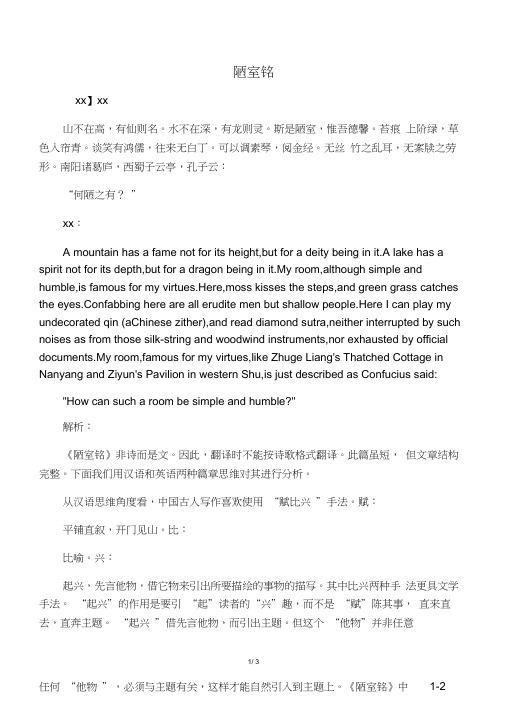
陋室铭xx】xx山不在高,有仙则名。
水不在深,有龙则灵。
斯是陋室,惟吾德馨。
苔痕上阶绿,草色入帘青。
谈笑有鸿儒,往来无白丁。
可以调素琴,阅金经。
无丝竹之乱耳,无案牍之劳形。
南阳诸葛庐,西蜀子云亭,孔子云:“何陋之有?”xx:A mountain has a fame not for its height,but for a deity being in it.A lake has a spirit not for its depth,but for a dragon being in it.My room,although simple and humble,is famous for my virtues.Here,moss kisses the steps,and green grass catches the eyes.Confabbing here are all erudite men but shallow people.Here I can play my undecorated qin (aChinese zither),and read diamond sutra,neither interrupted by such noises as from those silk-string and woodwind instruments,nor exhausted by official documents.My room,famous for my virtues,like Zhuge Liang's Thatched Cottage in Nanyang and Ziyun's Pavilion in western Shu,is just described as Confucius said:"How can such a room be simple and humble?"解析:《陋室铭》非诗而是文。
【2018最新】陋室铭英文翻译及赏析word版本 (4页)

本文部分内容来自网络整理,本司不为其真实性负责,如有异议或侵权请及时联系,本司将立即删除!== 本文为word格式,下载后可方便编辑和修改! ==陋室铭英文翻译及赏析陋室铭》是这首铭文作为经典流传至今,不仅因其思想内容积极乐观,境界高远,其语言上的特色上的独特魅力也是不容忽视的。
下面由小编为大家精心收集的陋室铭英文翻译及赏析,希望可以帮到大家!山不在高,有仙则名。
水不在深,有龙则灵。
斯是陋室,惟吾德馨。
苔痕上阶绿,草色入帘青。
谈笑有鸿儒,往来无白丁。
可以调素琴,阅金经。
无丝竹之乱耳,无案牍之劳形。
南阳诸葛庐,西蜀子云亭。
孔子云:“何陋之有?”注释⑴ 在:在于,动词。
⑵ 名:出名,著名,因--而著名,名词作动词。
⑶ 灵:显得有灵气,名词作动词。
⑷ 斯是陋室:这是简陋的屋子。
斯:此,这。
是:表判断。
陋室:简陋的屋子。
⑸ 惟吾德馨:只是我(住屋的人)的品德高尚(就不感到简陋了)惟:只。
吾:我,这里指住屋的人自己。
馨:香气,这里指品德高尚。
(6)上:动词,长到,蔓到。
⑺ 鸿儒:即大学问家,这里指博学而又品德高尚的人。
鸿:大。
儒:旧指读书人。
⑻ 白丁:平民,这里指没有什么学问的人。
⑼调素琴:弹奏不加装饰的琴。
调:调弄,这里指弹(琴)。
素琴:不加装饰的古琴。
⑽金经:指用泥金书写的佛经。
即《金刚经》。
⑾丝竹:指琴瑟、箫管等乐器,这里指奏乐的声音。
“丝”指弦乐器,“竹”指管乐器。
这里指音乐。
⑿之:助词,不译。
用在主谓间,取消句子的独立性。
⒀乱耳:扰乱双耳。
乱:形容词的使动用法,使……乱,扰乱。
⒁案牍(dú):官府的公文。
⒂劳形:使身体劳累(使动用法)。
劳:形容词的使动用法,使……劳累。
形:形体、身体。
⒃南阳:地名,今河南省南阳市西。
诸葛亮在出山之前,曾在南阳卧龙岗中隐居躬耕。
⒄南阳诸葛庐,西蜀子云亭:南阳有诸葛亮的草庐,西蜀有扬子云的亭子。
这两句是说,诸葛庐和子云亭都很简陋,因为居住的人很有名,所以受到人们的景仰。
《陋室铭》原文、翻译及赏析
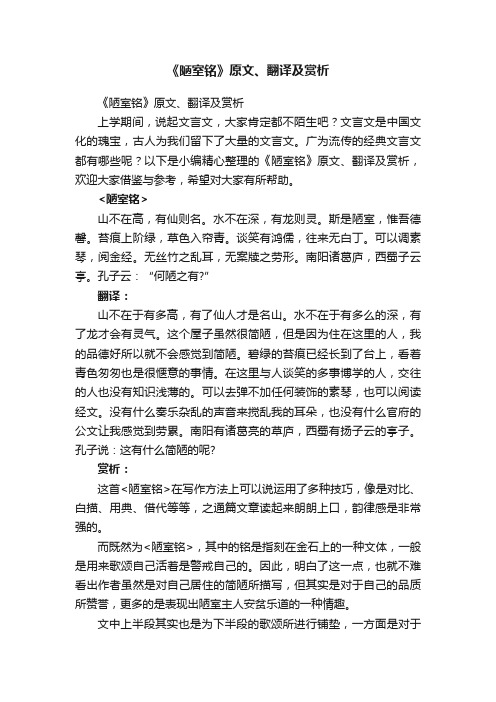
《陋室铭》原文、翻译及赏析《陋室铭》原文、翻译及赏析上学期间,说起文言文,大家肯定都不陌生吧?文言文是中国文化的瑰宝,古人为我们留下了大量的文言文。
广为流传的经典文言文都有哪些呢?以下是小编精心整理的《陋室铭》原文、翻译及赏析,欢迎大家借鉴与参考,希望对大家有所帮助。
<陋室铭>山不在高,有仙则名。
水不在深,有龙则灵。
斯是陋室,惟吾德馨。
苔痕上阶绿,草色入帘青。
谈笑有鸿儒,往来无白丁。
可以调素琴,阅金经。
无丝竹之乱耳,无案牍之劳形。
南阳诸葛庐,西蜀子云亭。
孔子云:“何陋之有?”翻译:山不在于有多高,有了仙人才是名山。
水不在于有多么的深,有了龙才会有灵气。
这个屋子虽然很简陋,但是因为住在这里的人,我的品德好所以就不会感觉到简陋。
碧绿的苔痕已经长到了台上,看着青色匆匆也是很惬意的事情。
在这里与人谈笑的多事博学的人,交往的人也没有知识浅薄的。
可以去弹不加任何装饰的素琴,也可以阅读经文。
没有什么奏乐杂乱的声音来搅乱我的耳朵,也没有什么官府的公文让我感觉到劳累。
南阳有诸葛亮的草庐,西蜀有扬子云的亭子。
孔子说:这有什么简陋的呢?赏析:这首<陋室铭>在写作方法上可以说运用了多种技巧,像是对比、白描、用典、借代等等,之通篇文章读起来朗朗上口,韵律感是非常强的。
而既然为<陋室铭>,其中的铭是指刻在金石上的一种文体,一般是用来歌颂自己活着是警戒自己的。
因此,明白了这一点,也就不难看出作者虽然是对自己居住的简陋所描写,但其实是对于自己的品质所赞誉,更多的是表现出陋室主人安贫乐道的一种情趣。
文中上半段其实也是为下半段的歌颂所进行铺垫,一方面是对于势利小人的鞭挞,一方面表现出自己的气节。
因此,这一篇更像是对于现实不屈的一种宣言。
海棠苏轼〔宋代〕原文东风袅袅泛崇光,香雾空蒙月转廊。
只恐夜深花睡去,故烧高烛照红妆。
译文袅袅的东风吹拂暖意融融,春色更浓。
花朵的香气融在朦胧的雾里,而月亮已经移过了院中的回廊。
最新陋室铭全文及翻译
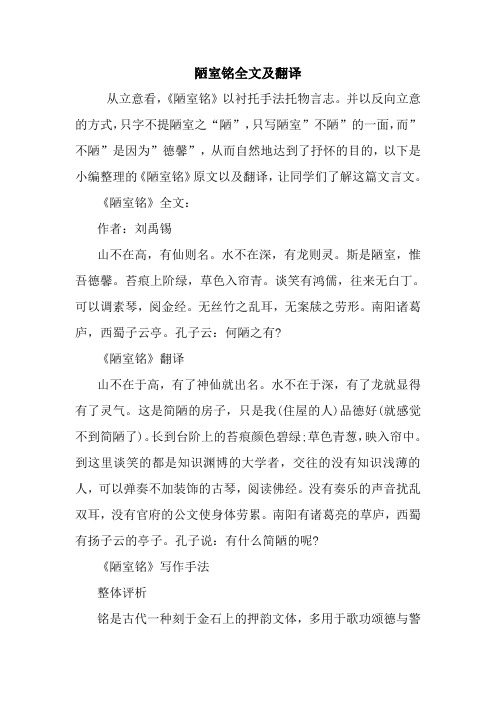
陋室铭全文及翻译从立意看,《陋室铭》以衬托手法托物言志。
并以反向立意的方式,只字不提陋室之“陋”,只写陋室”不陋”的一面,而”不陋”是因为”德馨”,从而自然地达到了抒怀的目的,以下是小编整理的《陋室铭》原文以及翻译,让同学们了解这篇文言文。
《陋室铭》全文:作者:刘禹锡山不在高,有仙则名。
水不在深,有龙则灵。
斯是陋室,惟吾德馨。
苔痕上阶绿,草色入帘青。
谈笑有鸿儒,往来无白丁。
可以调素琴,阅金经。
无丝竹之乱耳,无案牍之劳形。
南阳诸葛庐,西蜀子云亭。
孔子云:何陋之有?《陋室铭》翻译山不在于高,有了神仙就出名。
水不在于深,有了龙就显得有了灵气。
这是简陋的房子,只是我(住屋的人)品德好(就感觉不到简陋了)。
长到台阶上的苔痕颜色碧绿;草色青葱,映入帘中。
到这里谈笑的都是知识渊博的大学者,交往的没有知识浅薄的人,可以弹奏不加装饰的古琴,阅读佛经。
没有奏乐的声音扰乱双耳,没有官府的公文使身体劳累。
南阳有诸葛亮的草庐,西蜀有扬子云的亭子。
孔子说:有什么简陋的呢?《陋室铭》写作手法整体评析铭是古代一种刻于金石上的押韵文体,多用于歌功颂德与警戒自己。
明白了铭的意思,也就明白了题意,作者托物言志,通过对居室的描绘,极力形容陋室的不陋,“斯是陋室,惟吾德馨”这一中心,实际上也就是借陋室之名行歌颂道德品质之实,表达出室主人高洁傲岸的节操和安贫乐道的情趣。
《陋室铭》即开篇以山水起兴,水可以不在深,只要有了仙龙就可以出名,那么居处虽然简陋,却因主人的有“德”而“馨”,也就是说陋室因为有道德品质高尚的人存在当然也能出名,声名远播,刻金石以记之。
山水的平凡因仙龙而生灵秀,那么陋室当然也可借道德品质高尚之士播洒芬芳。
此种借力打力之技,实为绝妙,也可谓作者匠心独具。
特别是以仙龙点睛山水,构思奇妙。
“斯是陋室,唯吾德馨”,由山水仙龙入题,作者笔锋一转,直接切入了主题,看引论铺下了基础。
也点出了陋室不陋的原因,其原因是德馨二字。
在此点看出,作者写此随笔是经过反复思考的,绝对不是一时的灵感冲动。
陋室铭之英文翻译

Inscription of My Shack①A hill can get a great fame with an immortal living in it, despite of its height; a lake can gain a good reputation with a dragon lurking in it, despite of its depth. ②Although it is just a shack, one would not be aware of its simplicity because of my noble character. ③Green moss grows onto my stone steps, the verdant color of grass leaps into my door. ④All of the men chatting and laughing here are of wide erudition, none of the men contacting with me are of little learning. ⑤In my shack, I can play my undecorated Guqin (a seven-stringed plucked instrument), I can also read my treasured books. ⑥No mundane music would disturb my ears; no official documents would exhaust me (my body). ⑦This shack is similar to both Zhuge Liang’s thatched cottage in Nan Yan and Yang Ziyun’s pavilion in Xi Shu. ⑧Just like what Confucius said, ‘with a gentlemen living in it, how can one call it simple?’在做这篇翻译的时候,我用到的句子都比较对称,因为我注意到原文的句子有对称的特点。
刘禹锡陋室铭英文翻译及详细解析
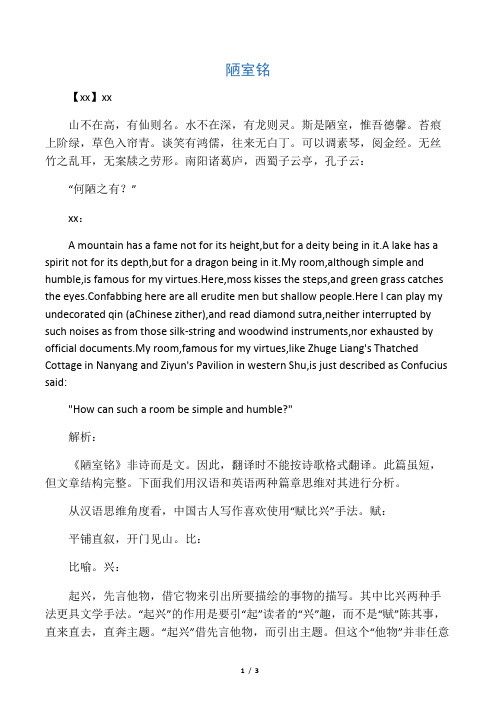
陋室铭【xx】xx山不在高,有仙则名。
水不在深,有龙则灵。
斯是陋室,惟吾德馨。
苔痕上阶绿,草色入帘青。
谈笑有鸿儒,往来无白丁。
可以调素琴,阅金经。
无丝竹之乱耳,无案牍之劳形。
南阳诸葛庐,西蜀子云亭,孔子云:“何陋之有?”xx:A mountain has a fame not for its height,but for a deity being in it.A lake has a spirit not for its depth,but for a dragon being in it.My room,although simple and humble,is famous for my virtues.Here,moss kisses the steps,and green grass catches the eyes.Confabbing here are all erudite men but shallow people.Here I can play my undecorated qin (aChinese zither),and read diamond sutra,neither interrupted by such noises as from those silk-string and woodwind instruments,nor exhausted by official documents.My room,famous for my virtues,like Zhuge Liang's Thatched Cottage in Nanyang and Ziyun's Pavilion in western Shu,is just described as Confucius said:"How can such a room be simple and humble?"解析:《陋室铭》非诗而是文。
古文观止英译本
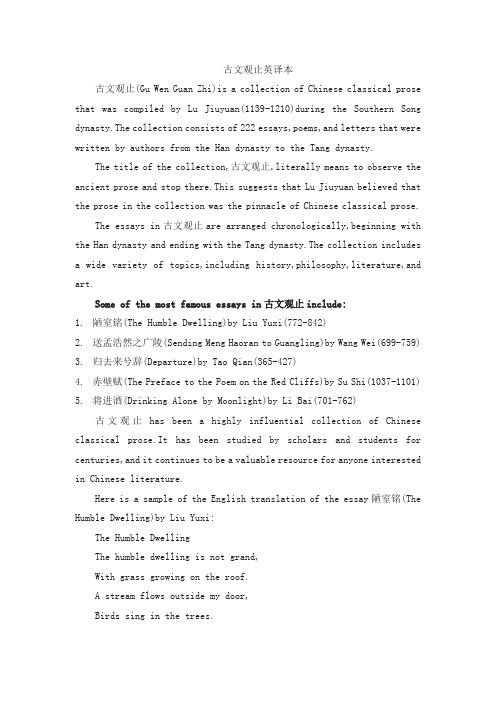
古文观止英译本古文观止(Gu Wen Guan Zhi)is a collection of Chinese classical prose that was compiled by Lu Jiuyuan(1139-1210)during the Southern Song dynasty.The collection consists of 222 essays,poems,and letters that were written by authors from the Han dynasty to the Tang dynasty.The title of the collection,古文观止,literally means to observe the ancient prose and stop there.This suggests that Lu Jiuyuan believed that the prose in the collection was the pinnacle of Chinese classical prose.The essays in古文观止are arranged chronologically,beginning with the Han dynasty and ending with the Tang dynasty.The collection includes a wide variety of topics,including history,philosophy,literature,and art.Some of the most famous essays in古文观止include:1.陋室铭(The Humble Dwelling)by Liu Yuxi(772-842)2.送孟浩然之广陵(Sending Meng Haoran to Guangling)by Wang Wei(699-759)3.归去来兮辞(Departure)by Tao Qian(365-427)4.赤壁赋(The Preface to the Poem on the Red Cliffs)by Su Shi(1037-1101)5.将进酒(Drinking Alone by Moonlight)by Li Bai(701-762)古文观止has been a highly influential collection of Chinese classical prose.It has been studied by scholars and students for centuries,and it continues to be a valuable resource for anyone interested in Chinese literature.Here is a sample of the English translation of the essay陋室铭(The Humble Dwelling)by Liu Yuxi:The Humble DwellingThe humble dwelling is not grand,With grass growing on the roof.A stream flows outside my door,Birds sing in the trees.I have books to read and friends to visit,What more do I need?I live simply,And my heart is content.This translation is by Lin Yutang(1895-1976),a Chinese-American writer and scholar.It is a relatively literal translation,which preserves the original meaning of the essay.。
《陋室铭》英文翻译及赏析

《陋室铭》英文翻译及赏析陋室铭朝代:唐代作者:刘禹锡原文:山不在高,有仙则名。
水不在深,有龙则灵。
斯是陋室,惟吾德馨。
苔痕上阶绿,草色入帘青。
谈笑有鸿儒,往来无白丁。
可以调素琴,阅金经。
无丝竹之乱耳,无案牍之劳形。
南阳诸葛庐,西蜀子云亭。
孔子云:何陋之有?《陋室铭》英文翻译An Eulogium on a Humble CellLiu YuxiA mount needs not be high; it becomes noted when on it fairies dwell.A body of water needs not be deep; it would be ensouled, if a dragon makes it its resting whereabouts.This hut of mine is a humble one, but I make it virtuously fragrantin repute.The green moss creeping on the stepping stones and the verdure inthe courtyard peeing through the screen do tell the presence of spring.Here could be heard the table-talks and laughters of renowned scholars, but the rough and gross come not hither their wares to sell.Here plain table-heptachord could be plucked and golden classicsread the worldly cares to quell.But there are without riotous strings and pipes to confuse the ears, and tedious official documents to ring quietude’s knell.Zhuge’s recluse cottage at Nanyang and Yang Xiong’s hermit arbo ur in West Shu, –according to Confucius, wherefore could either one of them be branded as a humble cell?《陋室铭》译文《陋室铭》注释⑴陋室:简陋的屋子。
最新陋室铭原文及翻译朗诵断句

陋室铭原文及翻译朗诵断句《陋室铭》通过具体描写”陋室”恬静、雅致的环境和主人高雅的风度来表述自己两袖清风的情怀,以下是小编整理的《陋室铭》朗诵断句以及原文翻译,供大家学习这篇古文。
《陋室铭》朗诵断句:作者:刘禹锡山/不在高,有仙/则名.水/不在深,有龙/则灵.斯是/陋室,惟吾/德馨.苔痕/上阶/绿,草色/入帘/青.谈笑/有/鸿儒,往来/无/白丁.可以/调/素琴,阅/金经.无/丝竹/之乱耳,无/案牍/之劳形.南阳/诸葛庐,西蜀/子云亭.孔子/曰:何陋/之有?《陋室铭》译文山不在于高,有了神仙就出名。
水不在于深,有了龙就显得有了灵气。
这是简陋的房子,只是我(住屋的人)品德好(就感觉不到简陋了)。
长到台阶上的苔痕颜色碧绿;草色青葱,映入帘中。
到这里谈笑的都是知识渊博的大学者,交往的没有知识浅薄的人,可以弹奏不加装饰的古琴,阅读佛经。
没有奏乐的声音扰乱双耳,没有官府的公文使身体劳累。
南阳有诸葛亮的草庐,西蜀有扬子云的亭子。
孔子说:有什么简陋的呢?《陋室铭》简介《陋室铭》选自《全唐文》卷六百零八集。
一说为刘禹锡所著,另一说则为早于刘禹锡所著。
“铭”本是古代刻于器具和碑文上用于警戒自己或陈述自己的功德的文字,多用于歌功颂德、祭奠祖先与昭申鉴戒。
后来逐渐发展演变为一种独立的文体,这种文体一般都是用韵的。
由于这种文体独特的历史渊源,使这种文体具有篇制短小、文字简约、寓意深刻等特点。
根据古文体的分类,“铭”是应用文。
明白了铭的意思,也就明白题意,即对陋室描述,通过陋室对论语进行歌颂。
实际上也就是借陋室之名行破迷开悟,引人入胜,这才是作者真正的意思。
托物言志,以此阐明作者的隐居生活态度是安贫乐道和人生观的价值。
此处陋室是刘禹锡于长庆四年任和州刺史时所建。
选自《全唐文》。
室成之后,由书法家柳公权书《陋室铭》写并勒之成碑,树建市旁。
后因战乱洗劫,室碑俱毁。
现存陋室系清乾隆知州宋思仁重建,1902年岭南金保福补书《陋室铭》碑一方。
陋室铭英译
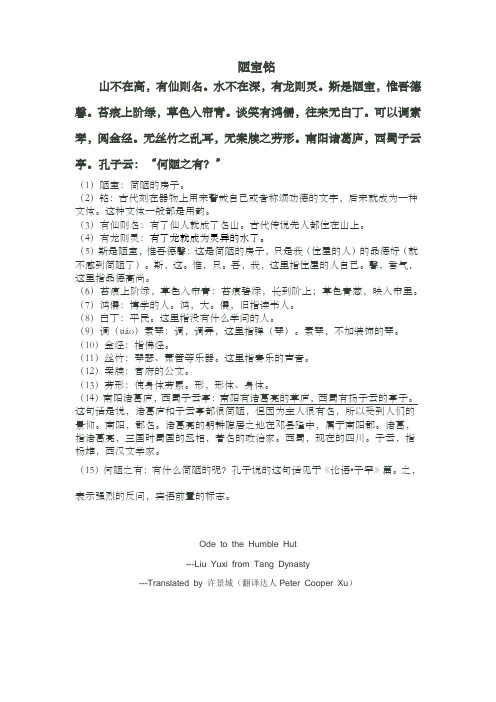
陋室铭山不在高,有仙则名。
水不在深,有龙则灵。
斯是陋室,惟吾德馨。
苔痕上阶绿,草色入帘青。
谈笑有鸿儒,往来无白丁。
可以调素琴,阅金经。
无丝竹之乱耳,无案牍之劳形。
南阳诸葛庐,西蜀子云亭。
孔子云:“何陋之有?”(1)陋室:简陋的房子。
(2)铭:古代刻在器物上用来警戒自己或者称颂功德的文字,后来就成为一种文体。
这种文体一般都是用韵。
(3)有仙则名:有了仙人就成了名山。
古代传说先人都住在山上。
(4)有龙则灵:有了龙就成为灵异的水了。
(5)斯是陋室,惟吾德馨:这是简陋的房子,只是我(住屋的人)的品德好(就不感到简陋了)。
斯,这。
惟,只。
吾,我,这里指住屋的人自己。
馨,香气,这里指品德高尚。
(6)苔痕上阶绿,草色入帘青:苔痕碧绿,长到阶上;草色青葱,映入帘里。
(7)鸿儒:博学的人。
鸿,大。
儒,旧指读书人。
(8)白丁:平民。
这里指没有什么学问的人。
(9)调(tiáo)素琴:调,调弄,这里指弹(琴)。
素琴,不加装饰的琴。
(10)金经:指佛经。
(11)丝竹:琴瑟、萧管等乐器。
这里指奏乐的声音。
(12)案牍:官府的公文。
(13)劳形:使身体劳累。
形,形体、身体。
(14)南阳诸葛庐,西蜀子云亭:南阳有诸葛亮的草庐,西蜀有扬子云的亭子。
这句话是说,诸葛庐和子云亭都很简陋,但因为主人很有名,所以受到人们的景仰。
南阳,郡名。
诸葛亮的躬耕隐居之地在邓县隆中,属于南阳郡。
诸葛,指诸葛亮,三国时蜀国的丞相,著名的政治家。
西蜀,现在的四川。
子云,指杨雄,西汉文学家。
(15)何陋之有:有什么简陋的呢?孔子说的这句话见于《论语•子罕》篇。
之,表示强烈的反问,宾语前置的标志。
Ode to the Humble Hut---Liu Yuxi from Tang Dynasty---Translated by 许景城(翻译达人Peter Cooper Xu)Renowned will be a hill if angles live,Regardless of its being high or low.Ensouled will be a rill if dragons live,In spite of its being deep or shallow.Humble is the hut where I dwell,Yet all shames my virtues dispel.Green are the stonesteps with lichens creeping,Blue is my room through screens from grass shining.Conversing to me are all erudites,Never dropped in by the illiterates.Reading the sutra and playing the lyre,Never are we troubled by noisy string and flute sound;Nor are we fatigued by heavy official files around.There in Nanyang sees Zhuge's thatched hut;There in West Shu stands Yang Xiong's arbor,Just as Confucius said, “Humble’s the hut?”散文版译文:An Inscription to the Humble Hut---Liu Yuxi from Tang Dynasty---Translated by 许景城(翻译达人Peter Cooper Xu)Renowned a mountain is not for its height but for the immortal who lives in it. Ensouled is a sea not for its depth but for the dragon who entrenches in it. It's true of my humble hut where I see my morality, virtues, and happiness but shames. Lichens are creeping up to the stone steps which are coated in green while grasses are shinning through the bamboo portiere of my room where is echoed blue. Coming to my house and conversing to me arethe persons who have great knowledge not illiterates. From time to time, we can play the lyre, or read Buddhist scriptures, never troubled by noisy string and flute sounds or the heavy official documents. Thus, my humble hut is like the thatched shed where Zhuge Liang from Nanyang lived and the thatched pavilion where Yang Ziyun from West Shu Shire dwelled. Just as a saying from Confucius goes like this, "Is it humble?"Notes:1. Liu Yuxi (772-842) was a famous poet and philosopher in Tang Dynasty. He used to bea investigating censor and an active revolutionary. After the failure of Yong Zhen Innovation, he lost his official hat and degraded to serve as an unimportant official in Langzhou (now Changde in Hunan).2. The Ode or Inscription was written by him to express the poet’s attitude towards life and wealth and ranks. He in pursuit of his high moral integrity would rather stay as a hermit in the humble hut than work with toadies in the imperial court.3. Zhuge Liang is the famous statesman and strategist of Shu Kingdom and before he became the prime minister to Liu Bei, the duke of Shu Kingdom, he lived as a recluse in Wolonggang, Nanyang in Henan province.4. Yang Ziyun, whose real name is Yangxiong, is a famous litterateur in West Han Dynasty, and he had a thatched pavilion in Shu Shire now in Sichuan.其他译文:译文1:An Epigraph in Praise of My Humble Home---Liu Yuxi---罗经国译A mountain needn't be high; It is famous so long as there is a deity on it. A lake needn't be deep; It has supernatural power so long as there is a dragon in it. My home is humble, But it enjoys the fame of virtue so long as I am living in it. The moss creeping onto the doorsteps turns them green. The color of the grass reflected through the bamboo curtains turns the room blue. Erudite scholars come in good spirits to talk with me, And among my guests there is no unlearned common man. In this humble room, I can enjoy playing my plainly decorated qin, or read the Buddhist Scriptures quietly, Without the disturbance of the noisy that jar on the ears, or the solemn burden of reading official documents. My humble home is like the thatched hut of Zhuge Liang of Nanyang, or the Pavilion Ziyun of Xishu. Confucius once said: "How could we call a room humble as long as there is a virtuous man in it?"译文2:An Epigraph for My Humble RoomWr. by Liu Yuxi (Tang Dynasty)Tr. by 颜林海A mountain has a fame not for its height, but for a deity being in it. A lake has a spirit not for its depth, but for a dragon being in it. My room, although simple and humble, is famous for my virtues. Here, moss kisses the steps, and green grass catches the eyes. Confabbing here are all erudite men but shallow people. Here I can play my undecorated qin (a Chinese zither), and read diamond sutra, neither interrupted by such noises as from those silk-string and woodwind instruments, nor exhausted by official documents. My room, famous for my virtues, like Zhuge Liang's Thatched Cottage in Nanyang and Ziyun's Pavilion in western Shu, is just described as Confucius said:"How can such a room be simple and humble?"译文3:An Eulogium on a Humble Cell--- Stephen 译A mount needs not be high; it becomes noted when on it fairies dwell. A body of water needs not be deep; it would be ensouled, if a dragon makes it its resting whereabouts. This hut of mine is a humble one, but I make it virtuously fragrant in repute. The green moss creeping on the stepping stones and the verdure in the courtyard peeing through the screen do tell the presence of spring. Here could be heard the table-talks and laughters of renowned scholars, but the rough and gross come not hither their wares to sell. Here plain table-heptachord could be plucked and golden classics read the worldly cares to quell. But there are without riotous strings and pipes to confuse the ears, and tedious official documents to ring quietude's knell. Zhuge's recluse cottage at Nanyang and Yang Xiong's hermit arbour in West Shu, — according to Confucius, wherefore could either one of them be branded as a humble cell?译文4:Inscription For My Shabby Hut---孙大雨译Mountains need not always be high, They're famed if therein fairies abide. Waters need not always be deep, They're hallowed where dragons are spied. This is a simple, mean abode, Only my virtue lends it fragrance. Moss smears a fringe of green upon The stone steps forming the terrace; And peering through the screen, there throbs the emerald of the lush grass. Great scholars drop in casually, And talk and laugh in abandoned ways; While in this cordial company Nonentities have ne'er a place. The ancient zither we might play, Or golden-lettered scriptures peruse. No concert bands our ears confuse, And no official files await Our tackling—to excruciate. To Zhuge's cottage at Nanyang, Or Ziyun's pavilion in Sichuan, mine may well be compared. So, as Confucius once had said, "Howcould it be considered mean?"译文5﹕Eulogy on My Humble Abode---海外逸士英译Known will hills be if fairies dwell, no matter high or low; and charmed will waters be if dragons lurk, no matter deep or shallow. A humble abode though this is, my virtues make it smell sweet. Verdant are the stonesteps overgrown with moss, and green seems the screen as the grass seen through it. I chat and laugh only with great scholars and have no intercourse with the ignorant. I can play simple zither and read Buddhist sutras; no string and bamboo instruments to grate on my ears and no government documents to weary my mortal form. That's what like Zhuge's cottage in Nanyang and Ziyun's pavilion in Xishu as Confucius quoth, "How canth it be humble?"。
陋室铭--英汉翻译赏析

英汉译文赏析作业舒卉陋室铭唐·刘禹锡山不在高,有仙则名。
水不在深,有龙则灵。
斯是陋室,惟吾德馨。
苔痕上阶绿,草色入帘青。
谈笑有鸿儒,往来无白丁。
可以调素琴,阅金经。
无丝竹之乱耳,无案牍之劳形。
南阳诸葛庐,西蜀子云亭。
孔子云:“何陋之有?”The Inscription of My Humble Room——Liu Yuxi from Tang DynastyA mountain needn't be so high, just becomes famous as there is a immortal. A lake needn't be so deep, just becomes miraculous as there is a dragon. My room is humble, but becomes fragrant as I am living in it. The moss creeping onto the stairs turns them green. The color of the grass through the curtains turns the room blue. Erudites come in and talk together. And there is no unlearned man. I can enjoy playing my clean qin and reading buddhist scriptures. There is no the disturbance of nosy that disturb the ears and any burden of reading official documents. Neither of Zhuge Liang's Cottage in Nanyang and Yang Ziyun's Pavilion in Xishu are not compared with mine. Confucius said: "Is there any humble?"译文的赏析:我认为陋室铭的这篇英文翻译还是不错的,个人也做了一些修改。
陋室铭原文及字词翻译

陋室铭原文及字词翻译《陋室铭》是唐代诗人刘禹锡创作的一篇托物言志骈体铭文,表达了作者身处陋室却不改其志的思想感情。
本文将介绍《陋室铭》的原文及字词翻译,并对其进行简要的解析。
下面是本店铺为大家精心编写的5篇《陋室铭原文及字词翻译》,供大家借鉴与参考,希望对大家有所帮助。
《陋室铭原文及字词翻译》篇1一、原文《陋室铭》原文如下:山不在高,有仙则名。
水不在深,有龙则灵。
斯是陋室,惟吾德馨。
苔痕上阶绿,草色入帘青。
谈笑有鸿儒,往来无白丁。
可以调素琴,阅金经。
无丝竹之乱耳,无案牍之劳形。
南阳诸葛庐,西蜀子云亭。
孔子云:“何陋之有?”二、字词翻译1. 陋室:简陋的房屋。
2. 铭:一种文体,用于刻在器物上,以记述事实或表达思想。
3. 山不在高,有仙则名:山的高度不在于其身形,只要有仙人居住,就会闻名于世。
4. 水不在深,有龙则灵:水的深浅不在于其实际深度,只要有龙居住,就会显得神灵非凡。
5. 斯是陋室,惟吾德馨:这就是我的简陋房屋,但因为我的德行高尚,所以才能闻名于世。
6. 苔痕上阶绿,草色入帘青:青苔印着台阶,绿草钻进窗帘,形容房间环境的简陋。
7. 谈笑有鸿儒,往来无白丁:与博学的人谈笑风生,来往的都是些有才学的人,没有不学无术的人。
8. 可以调素琴,阅金经:可以一边弹奏素琴,一边阅读金经。
9. 无丝竹之乱耳,无案牍之劳形:没有嘈杂的音乐声打扰耳朵,没有繁琐的公文劳累身体。
10. 南阳诸葛庐,西蜀子云亭:南阳有诸葛亮的草庐,西蜀有扬子云的亭子。
11. 孔子云:“何陋之有?”:孔子说:“这有什么简陋的呢?”三、简要解析《陋室铭》是刘禹锡托物言志的代表作,通过描写自己身处陋室,却因为德行高尚而闻名于世,表达了作者身处逆境却不改其志的思想感情。
《陋室铭原文及字词翻译》篇2陋室铭原文:山不在高,有仙则名。
水不在深,有龙则灵。
斯是陋室,惟吾德馨。
苔痕上阶绿,草色入帘青。
谈笑有鸿儒,往来无白丁。
可以调素琴,阅金经。
无丝竹之乱耳,无案牍之劳形。
陋室铭字词解释及翻译
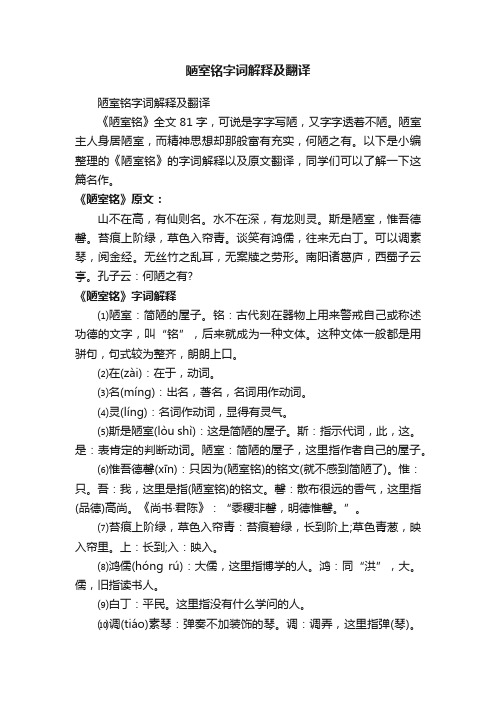
陋室铭字词解释及翻译陋室铭字词解释及翻译《陋室铭》全文81字,可说是字字写陋,又字字透着不陋。
陋室主人身居陋室,而精神思想却那般富有充实,何陋之有。
以下是小编整理的《陋室铭》的字词解释以及原文翻译,同学们可以了解一下这篇名作。
《陋室铭》原文:山不在高,有仙则名。
水不在深,有龙则灵。
斯是陋室,惟吾德馨。
苔痕上阶绿,草色入帘青。
谈笑有鸿儒,往来无白丁。
可以调素琴,阅金经。
无丝竹之乱耳,无案牍之劳形。
南阳诸葛庐,西蜀子云亭。
孔子云:何陋之有?《陋室铭》字词解释⑴陋室:简陋的屋子。
铭:古代刻在器物上用来警戒自己或称述功德的文字,叫“铭”,后来就成为一种文体。
这种文体一般都是用骈句,句式较为整齐,朗朗上口。
⑵在(zài):在于,动词。
⑶名(míng):出名,著名,名词用作动词。
⑷灵(líng):名词作动词,显得有灵气。
⑸斯是陋室(lòu shì):这是简陋的屋子。
斯:指示代词,此,这。
是:表肯定的判断动词。
陋室:简陋的屋子,这里指作者自己的屋子。
⑹惟吾德馨(xīn):只因为(陋室铭)的铭文(就不感到简陋了)。
惟:只。
吾:我,这里是指(陋室铭)的铭文。
馨:散布很远的香气,这里指(品德)高尚。
《尚书·君陈》:“黍稷非馨,明德惟馨。
”。
⑺苔痕上阶绿,草色入帘青:苔痕碧绿,长到阶上;草色青葱,映入帘里。
上:长到;入:映入。
⑻鸿儒(hóng rú):大儒,这里指博学的人。
鸿:同“洪”,大。
儒,旧指读书人。
⑼白丁:平民。
这里指没有什么学问的人。
⑽调(tiáo)素琴:弹奏不加装饰的琴。
调:调弄,这里指弹(琴)。
素琴:不加装饰的琴。
⑾金经:现今学术界仍存在争议,有学者认为是指佛经(《金刚经》),也有人认为是装饰精美的经典(《四书五经》),但就江苏教育出版社的语文书则指的是佛经(《金刚经》)而安徽考察则是后者。
金:珍贵的。
金者贵义,是珍贵的意思,儒释道的经典都可以说是金经。
陋室铭翻译加注释

陋室铭翻译加注释陋室铭翻译加注释《陋室铭》表现了作者不愿与世俗同流合污的心声和不戚戚于贫贱、不汲汲于富贵的高尚品德。
以下是小编整理的《陋室铭》译文以及注释,供同学们学习。
《陋室铭》原文:作者:刘禹锡山不在高,有仙则名。
水不在深,有龙则灵。
斯是陋室,惟吾德馨。
苔痕上阶绿,草色入帘青。
谈笑有鸿儒,往来无白丁。
可以调素琴,阅金经。
无丝竹之乱耳,无案牍之劳形。
南阳诸葛庐,西蜀子云亭。
孔子云:何陋之有?《陋室铭》译文山不在于高,有了神仙就出名。
水不在于深,有了龙就显得有了灵气。
这是简陋的房子,只是我(住屋的人)品德好(就感觉不到简陋了)。
长到台阶上的苔痕颜色碧绿;草色青葱,映入帘中。
到这里谈笑的都是知识渊博的大学者,交往的没有知识浅薄的人,可以弹奏不加装饰的古琴,阅读佛经。
没有奏乐的声音扰乱双耳,没有官府的公文使身体劳累。
南阳有诸葛亮的草庐,西蜀有扬子云的亭子。
孔子说:有什么简陋的呢?《陋室铭》注释⑴陋室:简陋的屋子。
铭:古代刻在器物上用来警戒自己或称述功德的文字,叫“铭”,后来就成为一种文体。
这种文体一般都是用骈句,句式较为整齐,朗朗上口。
⑵在(zài):在于,动词。
⑶名(míng):出名,著名,名词用作动词。
⑷灵(líng):名词作动词,显得有灵气。
⑸斯是陋室(lòu shì):这是简陋的屋子。
斯:指示代词,此,这。
是:表肯定的判断动词。
陋室:简陋的屋子,这里指作者自己的屋子。
⑹惟吾德馨(xīn):只因为(陋室铭)的铭文(就不感到简陋了)。
惟:只。
吾:我,这里是指(陋室铭)的铭文。
馨:散布很远的香气,这里指(品德)高尚。
《尚书·君陈》:“黍稷非馨,明德惟馨。
”。
⑺苔痕上阶绿,草色入帘青:苔痕碧绿,长到阶上;草色青葱,映入帘里。
上:长到;入:映入。
⑻鸿儒(hóng rú):大儒,这里指博学的人。
鸿:同“洪”,大。
儒,旧指读书人。
从功能对等理论角度分析《陋室铭》英译文

从功能对等理论角度分析《陋室铭》英译文功能对等理论注重利用自然恰当的译语再现源语的风格和意义,力求译语读者与源语读者能获得相似或相同的阅读感受。
在翻译中国古典诗歌时,译者应确保源语和译语在内容、风格、韵律和形式等方面的对等,使译本读者能从中理解中国古典诗歌的意蕴,也可以体验到诗歌形式美和韵律美,对于中国文化的传播也大有益处。
本文试图从功能对等理论角度将《陋室铭》三个译本进行比较、分析,找出最能让译本读者了解原诗意蕴且产生与源语读者相同阅读体验的译本。
标签:中国古典诗歌功能对等理论翻译奈达的功能对等翻译理论是翻译界的一个重大突破,自诞生之初就受到了翻译界的高度认同。
从上世纪80年代引入我国至今,一直是译者进行翻译实践的指导思想。
功能对等理论强调首先关注原文意义,减少原文表达方式对翻译实践的限制。
本研究对《陋室铭》三个英译本进行了比较,分析哪一个译本更加符合功能对等翻译理论的原则。
一、功能对等理论与中国古诗英译(一)功能对等理论简述尤金A.奈达(1914~2011)出生于美国俄克拉何马市(Oklahoma),美国著名的语言学家、翻译家、翻译理论家。
“他的翻译理论主要是建立在符号学、信息论、传播学和现代语言学发展的基础之上。
”①奈达基于现代语言学的研究成果,曾对翻译进行过描述性研究,并且深入思考翻译理论和实践的重要问题,不断修正和发展他的翻译理论观点,其翻译理论对中西方翻译研究产生了巨大的影响。
功能对等理论是指“译语读者和译本之间的关系一般应等同于源语读者和原文的关系”②,功能对等理论强调在翻译的过程中实现词汇、句法、篇章以及文体四方面的动态对等。
奈达认为“意义是最重要的,形式其次”③。
功能对等理论适用于英汉语的互译,肯定翻译的相对性和灵活性,但也为译者制定了合理的目标:强调先忠实于原文,再以功能对等提高译语和源语的契合程度,扩大了原文的可译性,为翻译实践提供了理论指导。
奈达认为翻译是一种科学,是一种技术,更是一种真正意义上的艺术。
《陋室铭》原文及注释翻译
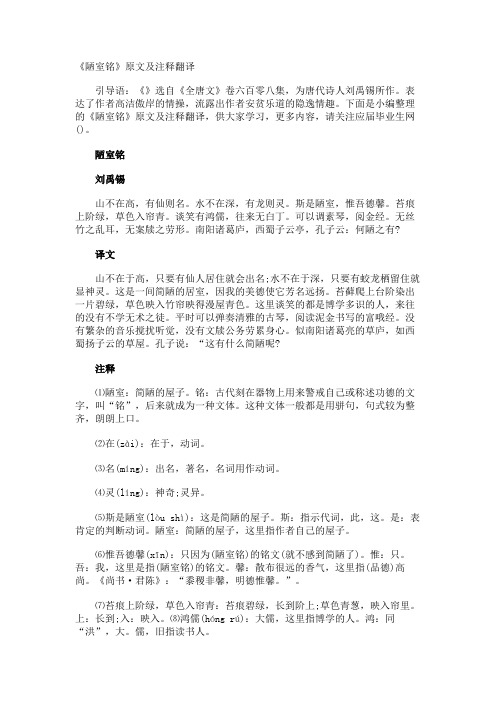
《陋室铭》原文及注释翻译引导语:《》选自《全唐文》卷六百零八集,为唐代诗人刘禹锡所作。
表达了作者高洁傲岸的情操,流露出作者安贫乐道的隐逸情趣。
下面是小编整理的《陋室铭》原文及注释翻译,供大家学习,更多内容,请关注应届毕业生网()。
陋室铭刘禹锡山不在高,有仙则名。
水不在深,有龙则灵。
斯是陋室,惟吾德馨。
苔痕上阶绿,草色入帘青。
谈笑有鸿儒,往来无白丁。
可以调素琴,阅金经。
无丝竹之乱耳,无案牍之劳形。
南阳诸葛庐,西蜀子云亭,孔子云:何陋之有?译文山不在于高,只要有仙人居住就会出名;水不在于深,只要有蛟龙栖留住就显神灵。
这是一间简陋的居室,因我的美德使它芳名远扬。
苔藓爬上台阶染出一片碧绿,草色映入竹帘映得漫屋青色。
这里谈笑的都是博学多识的人,来往的没有不学无术之徒。
平时可以弹奏清雅的古琴,阅读泥金书写的富哦经。
没有繁杂的音乐搅扰听觉,没有文牍公务劳累身心。
似南阳诸葛亮的草庐,如西蜀扬子云的草屋。
孔子说:“这有什么简陋呢?注释⑴陋室:简陋的屋子。
铭:古代刻在器物上用来警戒自己或称述功德的文字,叫“铭”,后来就成为一种文体。
这种文体一般都是用骈句,句式较为整齐,朗朗上口。
⑵在(zài):在于,动词。
⑶名(míng):出名,著名,名词用作动词。
⑷灵(líng):神奇;灵异。
⑸斯是陋室(lòu shì):这是简陋的屋子。
斯:指示代词,此,这。
是:表肯定的判断动词。
陋室:简陋的屋子,这里指作者自己的屋子。
⑹惟吾德馨(xīn):只因为(陋室铭)的铭文(就不感到简陋了)。
惟:只。
吾:我,这里是指(陋室铭)的铭文。
馨:散布很远的香气,这里指(品德)高尚。
《尚书·君陈》:“黍稷非馨,明德惟馨。
”。
⑺苔痕上阶绿,草色入帘青:苔痕碧绿,长到阶上;草色青葱,映入帘里。
上:长到;入:映入。
⑻鸿儒(hóng rú):大儒,这里指博学的人。
鸿:同“洪”,大。
陋室铭--英文版
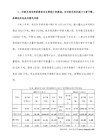
苔痕上阶绿,
The color of the grass reflected through the bamboo curtains turns the room blue.
草色入帘青。
Erudite scholars come in good spirits to talk with me,
有龙则灵。
My home is humble,
斯是陋室,
But it enjoys the fame of virtue so long as I am living in it.
惟吾德馨。
The moss creeping onto the doorsteps turns them green.
可以调素琴,阅金经。
Without the disturbance of the noisy that jar on the ears, or the solemn burden of reading official documents.
无丝竹之乱耳,s like the thatched hut of Zhuge Liang of Nanyang, or the Pavilion Ziyun of Xishu.
南阳诸葛庐,西蜀子云亭。
Confucius once said: "How could we call a room humble as long as there is a virtuous man in it?"
孔子云:“何陋之有?”
A mountain needn't be high,
山不在高,
It is famous so long as there is a deity on it.
《陋室铭》英文原文

《陋室铭》英文原文《陋室铭》英文原文(3)斯是陋室,惟吾德馨.这是一间简陋的屋子,只要我(住屋的人)的品德高尚,(就不感到简陋了).(4)苔痕上阶绿,草色入帘青.苔痕碧绿长到台阶上,草色青葱映入帘里.(5)谈笑有鸿儒,往来无白丁.在这里谈笑的都是学识渊博的学者,来来往往的没有学识浅薄的人.(6)可以调素琴,阅金经.可以弹奏不加装饰的古琴,阅览珍贵的`佛经.(7)无丝竹之乱耳,无案牍之劳形.没有嘈杂的管弦乐扰乱着(我的)双耳,没有官府的公文使(我的)身体劳累.(8)南阳诸葛庐,西蜀子云亭.南阳有诸葛亮的草庐,西蜀有杨子云的旧宅.孔子云:“何陋之有?”孔子说:“有什么简陋的呢?”断句山/不在高,有仙/则名.水/不在深,有龙/则灵.斯/是陋室,惟吾/德馨.苔痕/上阶绿,草色/入帘青.谈笑/有鸿儒,往来/无白丁.可以/调素琴,阅/金经.无/丝竹/之乱耳,无/案牍/之劳形.南阳/诸葛庐,西蜀/子云亭.孔子云:“何陋/之有?”本段写作特点最突出的艺术手法的比兴.文章开头运用“山”“水”类比,引出陋室具有名和灵的性质,点明主旨,暗示陋室不陋.(以山水比陋室,以仙龙比德,以名灵比馨)作品主题从主题看,《陋室铭》通过对居室交往人物生活情趣的描绘,极力形容陋室不陋,《陋室铭》一文表现了作者不与世俗同流合污,洁身自好、不追求声色娱乐的生活态度.表达了作者高洁傲岸的情操,流露出作者安贫乐道的隐逸情趣.“铭”是古代刻在器物上用来警戒自己或者称述功德的文字,后来发展成为一种文体,这种文体有用韵的特点. 刘禹锡所作散文简练深刻,自成一家.《陋室铭》是他的一篇传世杰作.从题目看,作者是在赞美陋室,为陋室作铭,其实不然,作者是借物抒情,托物言志.本文运用借物抒情、托物言志,通过对陋室的描写,表达了作者甘居陋室、安贫乐道的思想感情,表现了作者不慕富贵,不与世俗同流合污的高尚节操.立意从立意看,《陋室铭》以衬托手法托物言志.并以反向立意的方式,只字不提陋室之"陋",只写陋室"不陋"的一面,而"不陋"是因为"德行",从而自然地达到了抒怀的目的.表达了作者洁身自好、不慕富贵的节操和安贫乐道的情趣,以及不与世俗同流合污的情感.。
陋室铭英文翻译
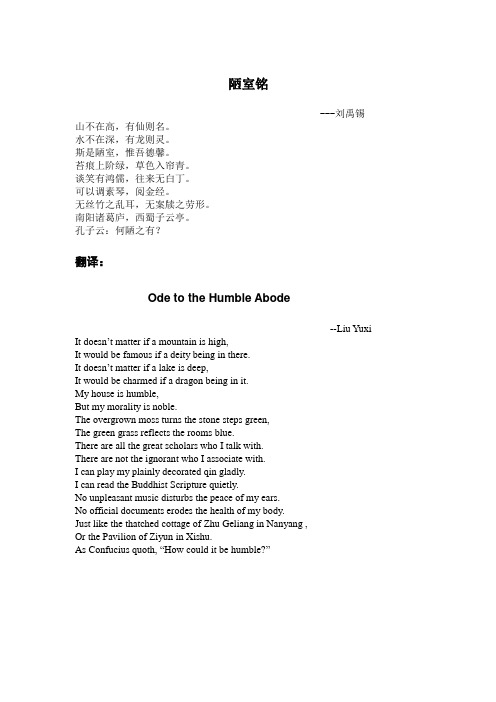
陋室铭---刘禹锡山不在高,有仙则名。
水不在深,有龙则灵。
斯是陋室,惟吾德馨。
苔痕上阶绿,草色入帘青。
谈笑有鸿儒,往来无白丁。
可以调素琴,阅金经。
无丝竹之乱耳,无案牍之劳形。
南阳诸葛庐,西蜀子云亭。
孔子云:何陋之有?翻译:Ode to the Humble Abode--Liu Yuxi It doesn’t matter if a mountain is high,It would be famous if a deity being in there.It doesn’t matter if a lake is deep,It would be charmed if a dragon being in it.My house is humble,But my morality is noble.The overgrown moss turns the stone steps green,The green grass reflects the rooms blue.There are all the great scholars who I talk with.There are not the ignorant who I associate with.I can play my plainly decorated qin gladly.I can read the Buddhist Scripture quietly.No unpleasant music disturbs the peace of my ears.No official documents erodes the health of my body.Just like the thatched cottage of Zhu Geliang in Nanyang ,Or the Pavilion of Ziyun in Xishu.As Confucius quoth, “How could it be humble?”Notes:陋室:简陋的屋子, 在题目中翻译为Humble Abode铭:是古代刻在器物上用来警戒自己或者称述功德的文字,后来成为一种文体。
陋室铭翻译及赏析

An Inscription of My Humble CottageLiu YuxiTranslated by江霞A mountain gets fame not for its height,but for its noble fairies.A sea gets anima not for its depth,but for its living beings.My humble cottage achieves honor,despite its shabbiness,for my decent qualities.Emerald moss cover the stonesteps,and green grass color my eyes.I talk with the talented,and associate without the unlearned.Being far from the disturbing noise,I play the plain musical instrument leisurely.Getting rid of the exhausting document,I enjoy the classic Buddhist Scripture carefreely.There stands Zhu Geliang’s famous hut in Nan Yang,and Yang Ziyun’s well-known pavilion in Xi Shu.Considering this,even Confucius wonders,“Why are these humble cottages not humble at all?”The Appreciation of My TranslationGenerally speaking, it is not easy to translate this Chinese classic poem into English. I find the 8th line the most difficult. How to arrange the sentence structure which includes two names of place within one sentence? And how to connect naturally this line with the former lines both in meaning and in form? I think and think, write and write, correct and correct,and finally, it is set down in plain English.( There stands Zhu Geliang’s famous hut in Nan Yang, and Yang Ziyun’s well-known pavilion in Xi Shu.)As to other lines, they turn out to be just several sentences. Or, maybe I can say that they just possess the form of a poem, but lack the lingering charm. If I regard them as sentences, they are beautiful, but when they are combined together to form a poem, their external beauty is not enough.Anyway, in my translation, there are still several words and sentences that I am satisfied with. Such as the parallel structure,the couplet lines,the rhetorical device I have used and the rhyme..The first 3 lines,especially the first 2 lines, are parallel structures. “get...not for...but for...” is in accordance with the original version “不在...有...则...”. At first,I used “is famous” instead of “get fame”, then considering that “get” is more active than “is”, so I adopted “get” at last. A sea gets anima because of the creature living in it, the “龙” may refer to the creature in the water, so I choose “living beings” to replace “dragon”.In the 3rd line, I make a little change in words(using “achieve” rather than “get”) and in sentence structure to avoid prolixity. (A mountain gets fame not for its height, but for its noble fairies. A sea gets anima not for its depth, but for its living beings. My humble cottage achieves honor,despite its shabbiness, for my decent qualities.)I like the 4th and 5th lines best. They are couplet lines which are loyal to the original version and are full of rhetorical devices. Such as the alliteration used in “cover”and “color”; the consonance used in “moss”and “grass”,”steps”and “eyes”,”talented”and “unlearned”; and the antithesis in “with” and “without”, “talented” and “unlearned”. Many people explain “帘” as “竹帘”, while I think it refers to “眼帘”. The moss cover the stonesteps like a green carpet, and similarly, the green of the grass maps into the eyes, like painting our eyes with green color. I think this explanation is also reasonable.( Emerald moss cover the stonesteps, and green grass color my eyes. I talk with the talented, and associate without the unlearned.)I mix together the 6th line and the 7th line when I translate as”无丝竹之乱耳,可以调素琴;无案牍之劳形,可以阅金经”, because these two lines are related to each other closely, and are something like reasons and results, which need to be mixed together. Again,these two lines are translated into parallel structure, started with two present participle phrases and ended with two adverbs.At first, my version of these two lines was, “Not being disturbed by the noisy sound,I...Not being exhausted by the secular document,I...”, then I thought it was strange to purposely make the structure the same, so I changed a little. Besides, the word “noise”is not suitable enough to express“丝竹之音”, and “document” is too modern to express “案牍”.( Being far from the disturbing noise, I play the plain musical instrument leisurely. Getting rid of the exhausting document, I enjoy the classic Buddhist Scripture carefreely.)I interpret the last line “何陋之有?” as “何不陋?”. By doing so, I think it is easier to arouse readers’ resonance, and it is natural for us to think back to the 3rd line. “Why are these humble cottages not humble at all?” That is “for my decent qualities”.( Considering this,even Confucius wonders, “Why are these humble cottages not humble at all?”)At last, I’d like to say something about the title “An Inscription of My Humble Cottage”. I did not change many times for the title,because I feel “inscription” and “humble cottage” are ok for “铭” and “陋室”.An Epigraph in Praise of My Humble HomeLiu YuxiTranslated by罗经国A mountain needn't be high;It is famous so long as there is a deity on it.A lake needn't be deep;It has supernatural power so long as there is a dragon in it.My home is humble,But it enjoys the fame of virtue so long as I am living in it.The moss creeping onto the doorsteps turns them green.The color of the grass reflected through the bamboo curtains turns the room blue.Erudite scholars come in good spirits to talk with me,And among my guests there is no unlearned common man.In this humble room, I can enjoy playing my plainly decorated qin, or read the Buddhist Scripturesquietly,Without the disturbance of the noisy that jar on the ears, or the solemn burden of reading officialdocuments.My humble home is like the thatched hut of Zhuge Liang of Nanyang, or the Pavilion Ziyun ofXishu.Confucius once said: "How could we call a room humble as long as there is a virtuous man in it?"A Brief Comparison Between My Translation and Professor Luo’sAfter comparing my translation with this work translated by Professor Luo, I find that the words and expressions I use are too easy to convey the deep meanings of this poem. The most impressive line is the 8th line—“My humble home is like the thatched hut of Zhuge Liang of Nanyang, or the Pavilion Ziyun of Xishu.” Professor Luo adds some words(My humble home is like) to make this line closely and naturally related to the former lines, it’s amazing!The first 3 lines, Professor Luo also applies parallelism, but his structures are more beautiful and his words are more accurate. Such as“needn't” “deity”“supernatural power” and “so long as”.The 4th line is written under the imagination of Professor Luo, so that it is alive and picturesque. Readers can easily think of such picture in which there are stonesteps covered by green moss, and the green of the grass reflecting on the bamboo curtains colors the room..While my version lacks such imagination.The 5th line, I think, is not so perfect. Though Professor Luo conveys the exact meaning, its language is plain and its form is not ordered beautifully. And the 6th and 7th lines adopt more accurate words than mine. “plainly decorated qin”is more specific than “plain musical instrument”, and I do not translate out the meaning of “jar on the ears”.The last line is closer to the original meaning than mine, while I think my understanding of the last line is also admissible.In a word, my version of translation lacks internal charm. The words and sentences are not elaborate enough to fully express the meaning. Since it is my first time to translate a Chinese classic poem, there are really lots of shortcomings which need to be improved.08级外院3班江霞0805020131周三下午第二大节课附:网上另一翻译版本山不在高,有仙则名。
- 1、下载文档前请自行甄别文档内容的完整性,平台不提供额外的编辑、内容补充、找答案等附加服务。
- 2、"仅部分预览"的文档,不可在线预览部分如存在完整性等问题,可反馈申请退款(可完整预览的文档不适用该条件!)。
- 3、如文档侵犯您的权益,请联系客服反馈,我们会尽快为您处理(人工客服工作时间:9:00-18:30)。
陋室铭山不在高,有仙则名。
水不在深,有龙则灵。
斯是陋室,惟吾德馨。
苔痕上阶绿,草色入帘青。
谈笑有鸿儒,往来无白丁。
可以调素琴,阅金经。
无丝竹之乱耳,无案牍之劳形。
南阳诸葛庐,西蜀子云亭。
孔子云:“何陋之有?”(1)陋室:简陋的房子。
(2)铭:古代刻在器物上用来警戒自己或者称颂功德的文字,后来就成为一种文体。
这种文体一般都是用韵。
(3)有仙则名:有了仙人就成了名山。
古代传说先人都住在山上。
(4)有龙则灵:有了龙就成为灵异的水了。
(5)斯是陋室,惟吾德馨:这是简陋的房子,只是我(住屋的人)的品德好(就不感到简陋了)。
斯,这。
惟,只。
吾,我,这里指住屋的人自己。
馨,香气,这里指品德高尚。
(6)苔痕上阶绿,草色入帘青:苔痕碧绿,长到阶上;草色青葱,映入帘里。
(7)鸿儒:博学的人。
鸿,大。
儒,旧指读书人。
(8)白丁:平民。
这里指没有什么学问的人。
(9)调(tiáo)素琴:调,调弄,这里指弹(琴)。
素琴,不加装饰的琴。
(10)金经:指佛经。
(11)丝竹:琴瑟、萧管等乐器。
这里指奏乐的声音。
(12)案牍:官府的公文。
(13)劳形:使身体劳累。
形,形体、身体。
(14)南阳诸葛庐,西蜀子云亭:南阳有诸葛亮的草庐,西蜀有扬子云的亭子。
这句话是说,诸葛庐和子云亭都很简陋,但因为主人很有名,所以受到人们的景仰。
南阳,郡名。
诸葛亮的躬耕隐居之地在邓县隆中,属于南阳郡。
诸葛,指诸葛亮,三国时蜀国的丞相,著名的政治家。
西蜀,现在的四川。
子云,指杨雄,西汉文学家。
(15)何陋之有:有什么简陋的呢?孔子说的这句话见于《论语•子罕》篇。
之,表示强烈的反问,宾语前置的标志。
Ode to the Humble Hut---Liu Yuxi from Tang Dynasty---Translated by 许景城(翻译达人Peter Cooper Xu)Renowned will be a hill if angles live,Regardless of its being high or low.Ensouled will be a rill if dragons live,In spite of its being deep or shallow.Humble is the hut where I dwell,Yet all shames my virtues dispel.Green are the stonesteps with lichens creeping,Blue is my room through screens from grass shining.Conversing to me are all erudites,Never dropped in by the illiterates.Reading the sutra and playing the lyre,Never are we troubled by noisy string and flute sound;Nor are we fatigued by heavy official files around.There in Nanyang sees Zhuge's thatched hut;There in West Shu stands Yang Xiong's arbor,Just as Confucius said, “Humble’s the hut?”散文版译文:An Inscription to the Humble Hut---Liu Yuxi from Tang Dynasty---Translated by 许景城(翻译达人Peter Cooper Xu)Renowned a mountain is not for its height but for the immortal who lives in it. Ensouled is a sea not for its depth but for the dragon who entrenches in it. It's true of my humble hut where I see my morality, virtues, and happiness but shames. Lichens are creeping up to the stone steps which are coated in green while grasses are shinning through the bamboo portiere of my room where is echoed blue. Coming to my house and conversing to me arethe persons who have great knowledge not illiterates. From time to time, we can play the lyre, or read Buddhist scriptures, never troubled by noisy string and flute sounds or the heavy official documents. Thus, my humble hut is like the thatched shed where Zhuge Liang from Nanyang lived and the thatched pavilion where Yang Ziyun from West Shu Shire dwelled. Just as a saying from Confucius goes like this, "Is it humble?"Notes:1. Liu Yuxi (772-842) was a famous poet and philosopher in Tang Dynasty. He used to bea investigating censor and an active revolutionary. After the failure of Yong Zhen Innovation, he lost his official hat and degraded to serve as an unimportant official in Langzhou (now Changde in Hunan).2. The Ode or Inscription was written by him to express the poet’s attitude towards life and wealth and ranks. He in pursuit of his high moral integrity would rather stay as a hermit in the humble hut than work with toadies in the imperial court.3. Zhuge Liang is the famous statesman and strategist of Shu Kingdom and before he became the prime minister to Liu Bei, the duke of Shu Kingdom, he lived as a recluse in Wolonggang, Nanyang in Henan province.4. Yang Ziyun, whose real name is Yangxiong, is a famous litterateur in West Han Dynasty, and he had a thatched pavilion in Shu Shire now in Sichuan.其他译文:译文1:An Epigraph in Praise of My Humble Home---Liu Yuxi---罗经国译A mountain needn't be high; It is famous so long as there is a deity on it. A lake needn't be deep; It has supernatural power so long as there is a dragon in it. My home is humble, But it enjoys the fame of virtue so long as I am living in it. The moss creeping onto the doorsteps turns them green. The color of the grass reflected through the bamboo curtains turns the room blue. Erudite scholars come in good spirits to talk with me, And among my guests there is no unlearned common man. In this humble room, I can enjoy playing my plainly decorated qin, or read the Buddhist Scriptures quietly, Without the disturbance of the noisy that jar on the ears, or the solemn burden of reading official documents. My humble home is like the thatched hut of Zhuge Liang of Nanyang, or the Pavilion Ziyun of Xishu. Confucius once said: "How could we call a room humble as long as there is a virtuous man in it?"译文2:An Epigraph for My Humble RoomWr. by Liu Yuxi (Tang Dynasty)Tr. by 颜林海A mountain has a fame not for its height, but for a deity being in it. A lake has a spirit not for its depth, but for a dragon being in it. My room, although simple and humble, is famous for my virtues. Here, moss kisses the steps, and green grass catches the eyes. Confabbing here are all erudite men but shallow people. Here I can play my undecorated qin (a Chinese zither), and read diamond sutra, neither interrupted by such noises as from those silk-string and woodwind instruments, nor exhausted by official documents. My room, famous for my virtues, like Zhuge Liang's Thatched Cottage in Nanyang and Ziyun's Pavilion in western Shu, is just described as Confucius said:"How can such a room be simple and humble?"译文3:An Eulogium on a Humble Cell--- Stephen 译A mount needs not be high; it becomes noted when on it fairies dwell. A body of water needs not be deep; it would be ensouled, if a dragon makes it its resting whereabouts. This hut of mine is a humble one, but I make it virtuously fragrant in repute. The green moss creeping on the stepping stones and the verdure in the courtyard peeing through the screen do tell the presence of spring. Here could be heard the table-talks and laughters of renowned scholars, but the rough and gross come not hither their wares to sell. Here plain table-heptachord could be plucked and golden classics read the worldly cares to quell. But there are without riotous strings and pipes to confuse the ears, and tedious official documents to ring quietude's knell. Zhuge's recluse cottage at Nanyang and Yang Xiong's hermit arbour in West Shu, — according to Confucius, wherefore could either one of them be branded as a humble cell?译文4:Inscription For My Shabby Hut---孙大雨译Mountains need not always be high, They're famed if therein fairies abide. Waters need not always be deep, They're hallowed where dragons are spied. This is a simple, mean abode, Only my virtue lends it fragrance. Moss smears a fringe of green upon The stone steps forming the terrace; And peering through the screen, there throbs the emerald of the lush grass. Great scholars drop in casually, And talk and laugh in abandoned ways; While in this cordial company Nonentities have ne'er a place. The ancient zither we might play, Or golden-lettered scriptures peruse. No concert bands our ears confuse, And no official files await Our tackling—to excruciate. To Zhuge's cottage at Nanyang, Or Ziyun's pavilion in Sichuan, mine may well be compared. So, as Confucius once had said, "Howcould it be considered mean?"译文5﹕Eulogy on My Humble Abode---海外逸士英译Known will hills be if fairies dwell, no matter high or low; and charmed will waters be if dragons lurk, no matter deep or shallow. A humble abode though this is, my virtues make it smell sweet. Verdant are the stonesteps overgrown with moss, and green seems the screen as the grass seen through it. I chat and laugh only with great scholars and have no intercourse with the ignorant. I can play simple zither and read Buddhist sutras; no string and bamboo instruments to grate on my ears and no government documents to weary my mortal form. That's what like Zhuge's cottage in Nanyang and Ziyun's pavilion in Xishu as Confucius quoth, "How canth it be humble?"。
